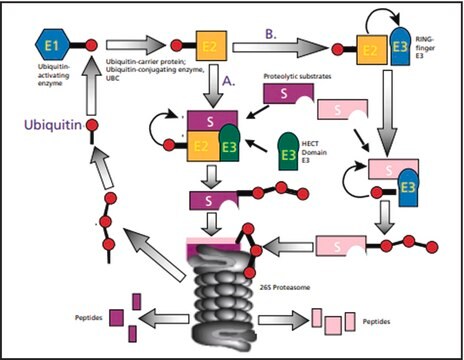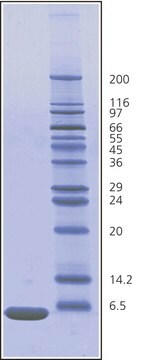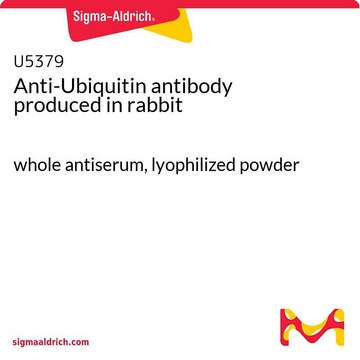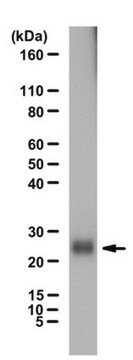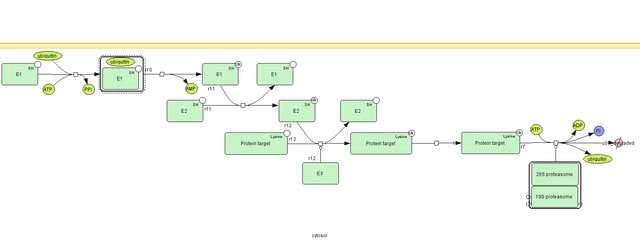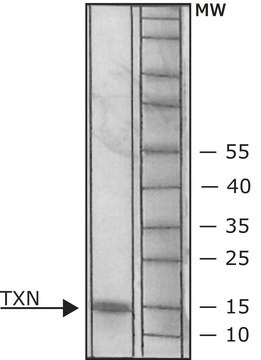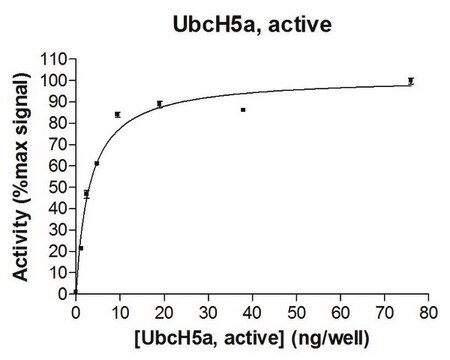Alle Fotos(2)
Wichtige Dokumente
U5507
Ubiquitin
recombinant, expressed in E. coli (N-terminal histidine tagged)
Anmeldenzur Ansicht organisationsspezifischer und vertraglich vereinbarter Preise
Alle Fotos(2)
About This Item
Empfohlene Produkte
Biologische Quelle
human
Qualitätsniveau
Rekombinant
expressed in E. coli (N-terminal histidine tagged)
Assay
≥95% (GE)
Form
lyophilized powder
Mol-Gew.
10.7 kDa
Methode(n)
ligand binding assay: suitable
Löslichkeit
Tris-HCl, pH 7.5: 1.0—1.10 mg/mL, clear to slightly hazy, colorless
Eignung
suitable for molecular biology
Lagertemp.
−20°C
Suchen Sie nach ähnlichen Produkten? Aufrufen Leitfaden zum Produktvergleich
Allgemeine Beschreibung
Research Area: CANCER
Ubiquitin is a highly conserved protein composed of 76 amino acids, and it is expressed universally in all eukaryotes, ranging from yeast to humans.
Ubiquitin is a highly conserved protein composed of 76 amino acids, and it is expressed universally in all eukaryotes, ranging from yeast to humans.
Ubiquitin, a globular protein is made of 76 amino acids and has lysine residues on its surface. It has a molecular weight of 8565 Da.N-Terminal histidine-tagged ubiquitin can replace native ubiquitin in the formation of poly-ubiquitin—protein conjugates. The histidine tag enables the separation and enrichment of protein conjugates on a Ni(II) column and the detection of conjugates in western blot by anti-histidine-tag antibodies.
Anwendung
Ubiquitin human can be used as a test compound for studying the isolation and characterization of rice E3-ubiquitin ligase and the role of OsHOS1 gene in the modulation of the cold stress response.
Ubiquitin human has been used:
- as a substrate in in vitro ubiquitination assays
- as substrate in ADP-ribosylation and ubiquitylation assays
- to supplement the 64 ng of endogenous ubiquitin in fresh blood for experiment grouping in order to study its potential clinical impact on cancer prognosis
Biochem./physiol. Wirkung
Ubiquitin is a small regulatory protein present in eukaryote tissues. Exogenous ubiquitin can stimulate apoptosis in numerous cell lines. E7 protein of human papilloma virus-16 stimulates Retinoblastoma Protein degradation via Ubiquitin-Proteasome Pathway.
Ubiquitin plays a key role in normal eukaryotic cell function. It participates in the development and function of the immune system. This immunophilin is also known to participate in immune homeostasis. The ubiquitin peptide fragment (U50-59) is capable of blocking cellular and humoral immunity.
Ubiquitin-mediated proteolysis plays an important role in several basic cellular processes including regulation of cell cycle and division, differentiation and development, modulation of cell-surface receptors, the secretory pathway (protein transport), morphogenesis of neuronal networks, transcriptional regulation and signal transduction, transcriptional silencing, DNA repair, long-term memory, and circadian rhythms.
Angaben zur Herstellung
Ubiquitin human can dissolved in 0.02 M Tris-HCl at a concentration of 1.00 - 1.10 mg/ml to yield a clear to slightly hazy, colorless solution.
Lagerklassenschlüssel
11 - Combustible Solids
WGK
WGK 3
Flammpunkt (°F)
Not applicable
Flammpunkt (°C)
Not applicable
Persönliche Schutzausrüstung
Eyeshields, Gloves, type N95 (US)
Hier finden Sie alle aktuellen Versionen:
Besitzen Sie dieses Produkt bereits?
In der Dokumentenbibliothek finden Sie die Dokumentation zu den Produkten, die Sie kürzlich erworben haben.
Kunden haben sich ebenfalls angesehen
New crystal form of human ubiquitin in the presence of magnesium
Camara-Artigas A, et al.
Acta Crystallographica. Section F, Structural Biology Communications, 72(1), 29-35 (2016)
Extracellular Ubiquitin is the Causal Link between Stored Blood Transfusion Therapy and Tumor Progression in a Melanoma Mouse Model
Zhang J, et al.
Journal of Cancer, 10(12), 2822-2835 (2019)
Jingjun Zhang et al.
Journal of Cancer, 10(12), 2822-2835 (2019-07-02)
Background: The transfusion of blood that has been stored for some time was found to be associated with transfusion-related immune modulation (TRIM) responses in cancer patients, which could result in poor clinical outcomes, such as tumor recurrence, metastasis and reduced
Proteomics strategy to identify substrates of LNX, a PDZ domain-containing E3 ubiquitin ligase
Guo Z, et al.
Journal of Proteome Research, 11(10), 4847-4862 (2012)
Antigenic mimicry of ubiquitin by the gut bacterium Bacteroides fragilis: a potential link with autoimmune disease
Stewart L, et al.
Clinical and Experimental Immunology, 194(2), 153-165 (2018)
Unser Team von Wissenschaftlern verfügt über Erfahrung in allen Forschungsbereichen einschließlich Life Science, Materialwissenschaften, chemischer Synthese, Chromatographie, Analytik und vielen mehr..
Setzen Sie sich mit dem technischen Dienst in Verbindung.